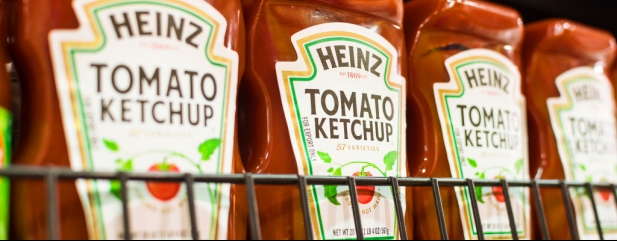Archived article
Please note that tax, investment, pension and ISA rules can change and the information and any views contained in this article may now be inaccurate.
Why consumer-facing stocks face a big pricing challenge

Red hot inflation has forced some consumers to make tough choices but so far results season has left a slew of consumer goods giants looking in fairly fine fettle.
The reason, big brand names are incredibly sticky, people put them in their shopping baskets without really thinking about the price, which is just as well as prices have been shooting up, something which has created tension between some supermarkets and manufacturers.
Kraft Heinz (KHC:NYSE) which makes everything from beans to cream cheese recently stopped stocking Tesco (TSCO) after a row over price, although that’s now been resolved it raised interesting questions about the balance of power and the sustainability of price hikes.
Some Kraft Heinz lines have shot up by 12% in the last quarter and clearly that’s been enough to put some shoppers off because sales volumes have fallen but only by 2.3%. Kraft CEO Carlos Abrams Riviera says that ‘different types of consumer are reacting to the economy in a different way’ and looking at the latest data from the Office for National Statistics' Opinions and Lifestyle survey he’s got a point.
Some people say they are buying less (50%) but just as many people are buying exactly the same amount of food as they always have done (50%), they’re just noticing that they are paying more for it.
The question Kraft Heinz and its competitors have to answer is how far can they tip the balance before enough people grow resistant to those higher prices that the higher prices themselves aren’t enough to maintain profits?
Significant headwinds
Nearly all consumer-facing businesses have warned of ‘significant headwinds’ during this earnings cycle and all are considering the best ways to maintain margins whilst keeping customers. Kraft is making adjustments to the kind of products it sells, the size of those products and the packaging they are wrapped in.
Health and hygiene specialist Reckitt Benckiser (RKT) is focusing on efficiencies and opportunities. It’s seen sales surge thanks in part to a shortage of baby milk in the United States which has enabled it to grab market share.
Even as that situation normalises it’s expecting to keep a good chunk of its new customer base who’ve been won over by the brand. And its core business has thrived despite passing on extra costs to its customers.
Many of the items it produces are considered essentials and with memories of the pandemic still fresh nobody wants to cut back on cleaning products. Reckitt’s a trusted partner in many of our lives and that trust carries a premium. We feel safer using what’s familiar and because of that we are prepared to pay more (up to a point).
But companies need to consider the narrative. Customers getting pay rises that get nowhere close to inflationary levels will take a dim view of brands adding to the pain in their wallets.
Consumers don’t necessarily expect manufacturers to swallow all of the rising costs, but they do expect them to play fair. Inevitably shareholders will focus on the numbers but they also need to ponder the wider reputation of a company and its brand.
Bumper profits might not be such a boon if they precede a serious fall in sales, price rises need to be carefully considered and clearly explained. The demise of the 99p cheeseburger could take the shine off the golden arches but McDonalds (MCD:NYSE) has played the price hike with a straight bat explaining directly to its customers that it had delayed and minimised prices rises for as long as it could, and the fact it’s been unchanged for 14 years is a great hook.
The value nature of its offer does provide a degree of insulation, an extra 20 pence isn’t going to break the bank.
It's the ongoing nature of cost inflation that’s weighing on those consumer giants. Diageo (DGE) CEO Ivan Menezes fears a ‘potential weakening of consumer spending power’ which could make the company’s last lot of numbers harder to replicate.
The alcoholic drinks giant has benefited from some external factors but that doesn’t detract from a sure-footed strategy which positioned it to take advantage of those shifts.
It’s spent money developing and marketing its premium spirits range, products which deliver much higher margins than craft beers and have become increasingly popular with younger drinkers. While cutbacks are becoming a way of life ‘treats’, or ‘little luxuries’ are right up there with those essentials and don’t forget even a discretionary item like a new washing machine can become an ‘essential’ if the home’s machine breaks down.
Pricing during these sensitive times is a dance, carefully choreographed and executed with perfect timing it can allow companies to continue to thrive. But one misstep and consumers will walk away, searching for another dance partner.
Even if a company has successfully passed on price hikes to date that’s no guarantee it will be able to do so again. Consumers will draw a line, and every line will be different.
Important information:
These articles are provided by Shares magazine which is published by AJ Bell Media, a part of AJ Bell. Shares is not written by AJ Bell.
Shares is provided for your general information and use and is not a personal recommendation to invest. It is not intended to be relied upon by you in making or not making any investment decisions. The investments referred to in these articles will not be suitable for all investors. If in doubt please seek appropriate independent financial advice.
Investors acting on the information in these articles do so at their own risk and AJ Bell Media and its staff do not accept liability for losses suffered by investors as a result of their investment decisions.
Issue contents
Feature
- FTSE 250: Can UK mid caps shine again and which stocks should you buy?
- Why Chipotle’s red-hot pricing power has positive read-across for Tortilla
- Why companies who cross-sell have happy customers and investors
- Explaining economic moats and why investors are so keen to own businesses which have them
- Why companies which can lower the cost of doing business are well positioned

 magazine
magazine








